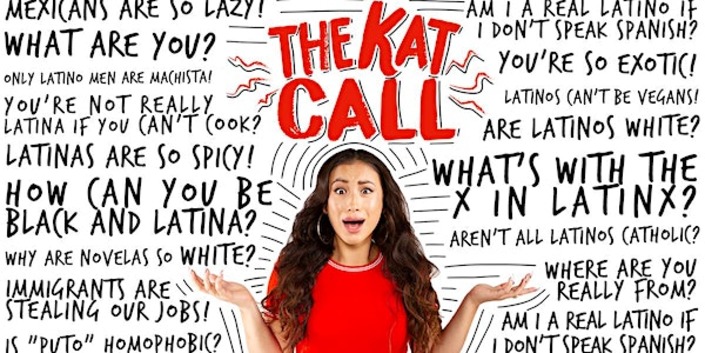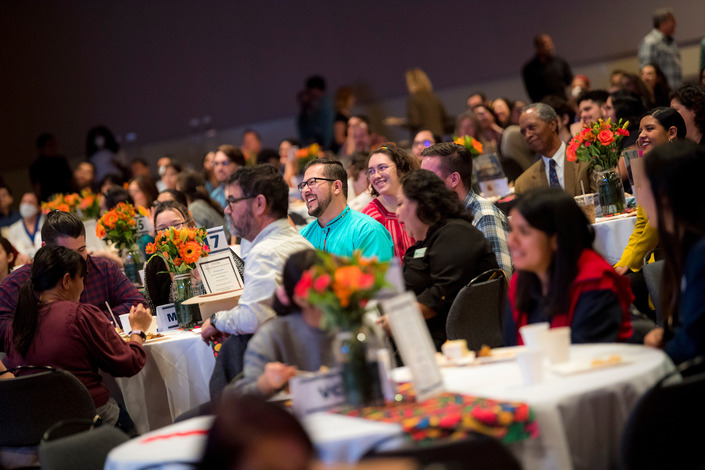Q&A with Latinx Heritage Month Speaker Kat Lazo
Producer discusses calling out cultural misconceptions and how her Latinx identity shapes her work
Story by:
Published Date
Article Content
Award-winning director, producer and host Kat Lazo—best known for her Mitú series "The Kat Call"—will deliver the keynote address Oct. 25 for UC San Diego’s 3rd Annual Latinx Heritage Month Commemoration Ceremony. The event at Price Center will culminate the university’s monthlong celebration honoring the rich cultural heritage and contributions of the Latinx community.
The Colombian-Peruvian New Yorker has made a name for herself as the Internet's favorite no-nonsense Latina who tells it how it is, both in front of and behind the camera. Lazo began her career as a YouTuber, going on to become a successful self-taught video producer covering topics such as taboos in the Latino community, the Reggaetón music landscape and more. She was also the host of the Thrillist original travel series “Barrio USA,” which explored the vibrant world of Latinx culture all over America.
UC San Diego Today spoke with Lazo to learn about her career journey, how her Latinx identity shapes her work and more.
This interview has been edited for length and clarity.
UC San Diego is excited to kick off its Latinx Heritage Month, showcasing special events and programs that celebrate the history, culture and contributions of the Latinx community. What does Latinx Heritage Month mean to you?
For me, it's an opportunity for us to actually learn about one another. These umbrella terms—Hispanic, Latino, Latinx and Latina—were all created by outsiders, and we’ve gone on to take these identities. While this is fine, one of the negative things about these umbrella terms is that it lumps a lot of different people together and pressures us to have a commonality. I think that Latinx Heritage Month is an opportunity for us to take a seat back and listen to the differences that we have culturally. By doing this, we can become more unified.

Can you talk about your identity as a member of the Latinx community? How does it shape your work?
I'm a born-and-raised New Yorker. I'm also the eldest daughter to South American immigrant parents. My mom immigrated from Bogota, Colombia and my father from Lima, Peru, and they both met each other in New York.
Although I am South American, I was culturally shaped by New York Latinx culture which is predominantly Caribbean. This has informed a lot about how I view us as a community—it's never been about just South American Pride, but being very mindful that there are other communities within the Latinx umbrella that deserve just as much attention.
In terms of how my identity has shaped my work— given that the predominant culture in New York is Caribbean and I'm South American—I have always felt like an outsider. But I think that this has been a really positive experience because it has enabled me to be a fly on the wall and listen into conversations about our community’s differences and difficulties. It has also allowed me to have more empathy and sympathy for how some of our communities feel very unheard or unappreciated.
We’d love to learn about your path to becoming a director, producer and host. What inspired you to pursue a career in the entertainment industry? How did you get your start?
I went to a performing arts high school and initially wanted to be an actress. Unfortunately, once I graduated and started auditioning, I was faced with the reality that no one cared about my formal theater training. They only cared about how I was going to fit the stereotypes that they had written out for a Latina role, which I found really discouraging.
I decided to go to college and thought I would work in the entertainment industry, perhaps in advertising. However, I soon discovered that advertising was basically the same thing. This led me to have an identity crisis where I needed to figure out what I was going to do since I had studied something that I was not a fan of.
So, what does a millennial do who’s having an identity crisis? I created my own YouTube channel! I started vlogging which is how I started educating myself about production, scriptwriting and more.
I was then hired by the Latinx digital platform Mitú, where I worked behind the camera creating online videos. Many of them were docustyle profile pieces featuring individuals in the New York community that I felt needed to be highlighted, such as Afro-Latino poets and butch Caribbean authors.
Your show “The Kat Call” debunked various misconceptions about the Latinx community. What motivated you to create this show?
I think the videos I created at Mitú really disrupted the already-established audience that the platform had created at that time. There were a lot of homophobic, anti-black and sexist comments being left on the videos.
While people told me to dismiss the comments, I saw this as an opportunity to speak to the people leaving them and create a series that spoke to our community. These comments were being left by our tíos, tías and primos—I felt it was my responsibility to speak to them and increase their exposure to different identities that they weren’t used to.
That is how “The Kat Call” came to be. Each episode spoke to a concept or an identity that perhaps folks were uncomfortable to discuss.
What has been one of the most impactful lessons you’ve learned while building your career?
One of the lessons that I’d love to share with other people is that all of the tools that you need in order to succeed already exist within you.
For example, even though I didn't go to film school, I now realize that my parents' history has definitely informed my ability to do what I do today. My mom is a housekeeper and my father worked at a factory as a cardboard display designer.
I have been able to recontextualize what they did. So, while people might say mom is just a housekeeper, my mom is actually an entrepreneur. She created her own business, accumulated her own clientele and works for herself.
As a freelance producer, that's what I do. I work for myself, create my own hours and am in charge of seeking out projects in order to get the money that I need.
On my father's side, while people can say he is just a factory worker, he actually comes from a long line of creatives and artists. So, I get my entrepreneurial spirit from my mother and I get my creative juices from my father.

We are looking forward to having you on campus this October for our kickoff event! What do you hope your campus community will take away from your keynote address?
What I hope that folks will walk away with is a feeling of being uncomfortable. The keynote is all about addressing the complexities within the Latinx communities and recognizing that oppression and privilege exists at the same time in each and every one of us.
Unfortunately, it can feel a little uncomfortable when you point the finger and make people aware of the ways in which they are subconsciously not acknowledging their privilege. But I think we have to push through that in order to become a unified community.
To learn more about the upcoming Latinx Heritage Month commemoration ceremony featuring Kat Lazo and register for other heritage month events, please visit the online calendar.
Share This:
Stay in the Know
Keep up with all the latest from UC San Diego. Subscribe to the newsletter today.




